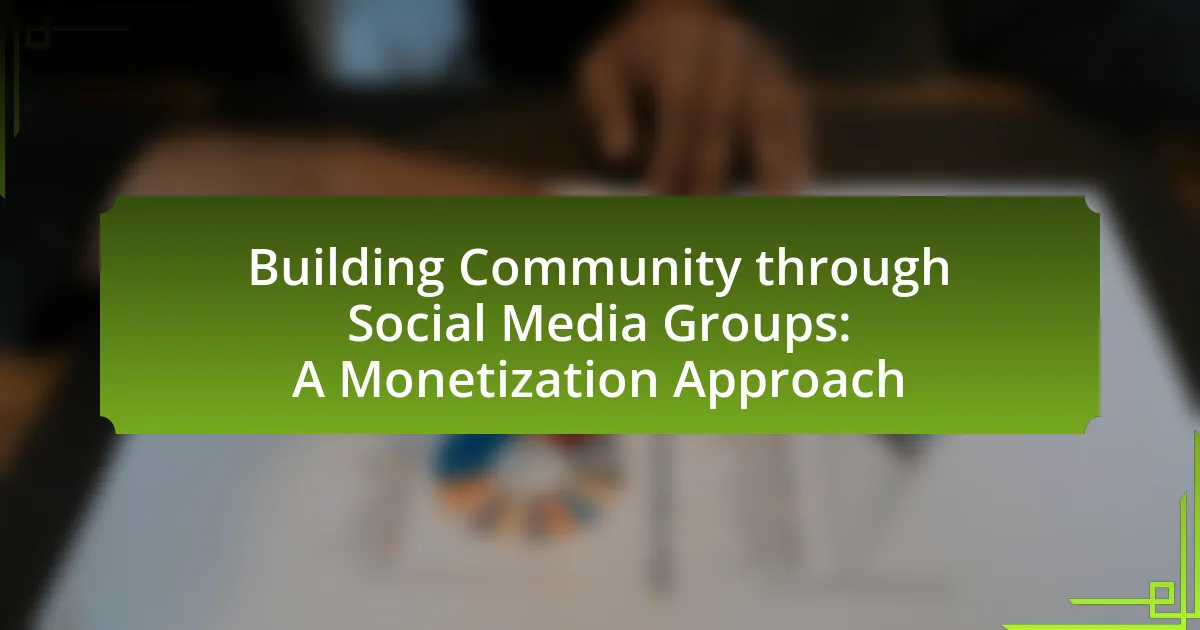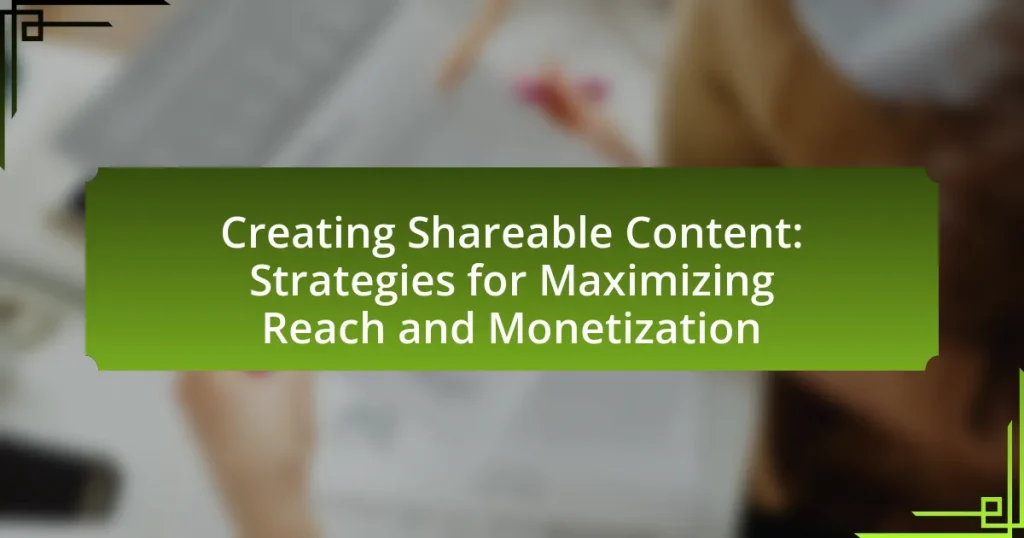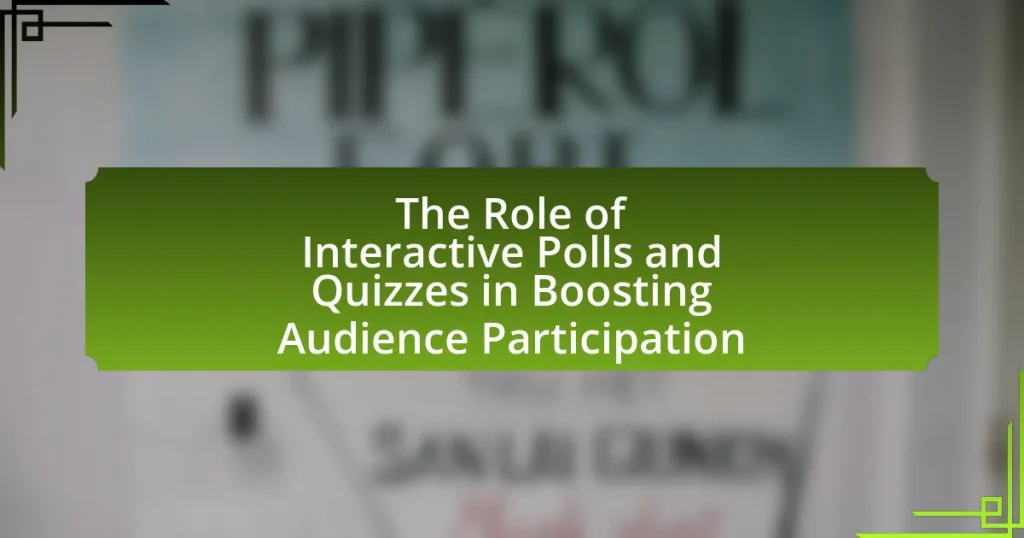Building community through social media groups is a process that creates spaces for individuals with shared interests to connect and support one another, enhancing engagement and loyalty. The article explores how social media groups facilitate community building through features like active moderation and relevant content sharing, while also examining the psychological benefits of belonging and the impact on brand loyalty. Additionally, it discusses monetization strategies such as subscription models and affiliate marketing, the challenges faced by community builders, and best practices for enhancing engagement and ethical monetization. Key metrics for tracking successful community monetization are also highlighted, providing a comprehensive overview of the dynamics involved in fostering and monetizing online communities.
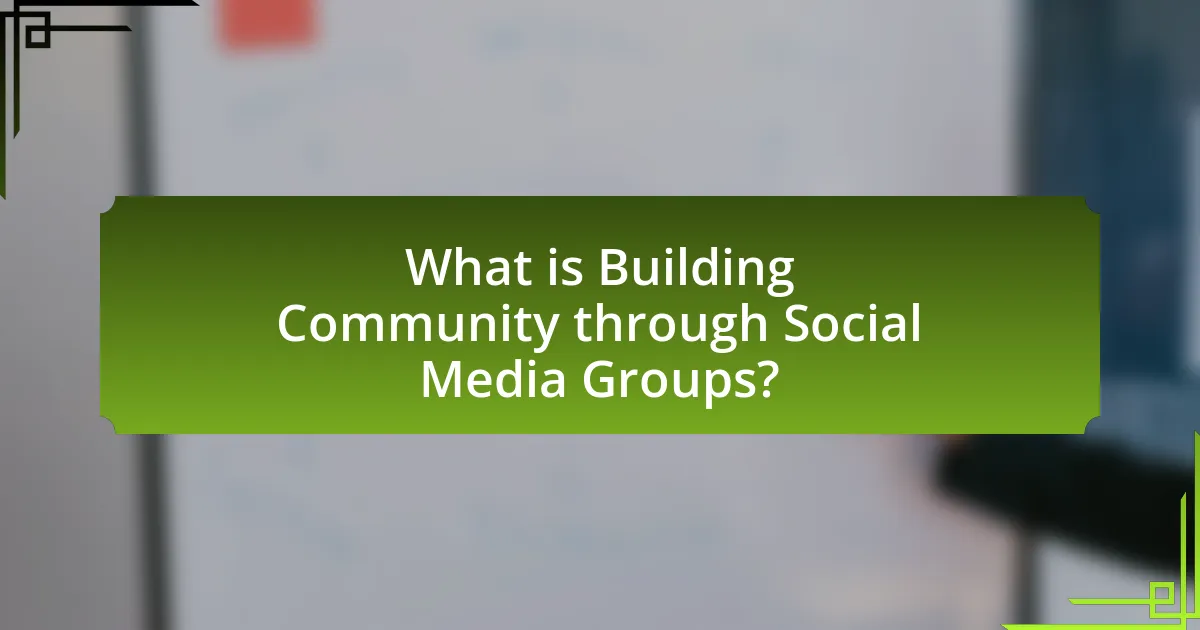
What is Building Community through Social Media Groups?
Building community through social media groups involves creating a space where individuals with shared interests can connect, interact, and support one another. This process fosters engagement and collaboration among members, enhancing their sense of belonging and loyalty to the group. Research indicates that communities built on social media can lead to increased user retention and participation, as evidenced by a study from the Pew Research Center, which found that 70% of users feel more connected to others through online communities.
How do social media groups facilitate community building?
Social media groups facilitate community building by providing a platform for individuals to connect, share interests, and engage in discussions. These groups create a sense of belonging among members, as they allow for the exchange of ideas, support, and resources tailored to specific topics or interests. Research indicates that 70% of users feel more connected to their communities through social media, highlighting the effectiveness of these platforms in fostering relationships. Additionally, social media groups enable real-time communication and collaboration, which strengthens community ties and encourages active participation.
What are the key features of social media groups that promote engagement?
Key features of social media groups that promote engagement include active moderation, relevant content sharing, and community-driven discussions. Active moderation ensures that conversations remain respectful and on-topic, fostering a safe environment for members to participate. Relevant content sharing, such as articles, videos, and polls, keeps the group dynamic and encourages members to contribute their thoughts and experiences. Community-driven discussions, where members feel valued and heard, enhance interaction and build a sense of belonging. These features collectively create an engaging atmosphere that motivates members to participate consistently.
How do different platforms support community interactions?
Different platforms support community interactions through features designed to facilitate communication, engagement, and collaboration among users. For instance, Facebook groups allow members to post content, comment, and react, fostering discussions and community building. Reddit utilizes subreddits where users can share posts and engage in threaded discussions, promoting niche community interactions. Discord provides real-time voice and text chat capabilities, enabling dynamic conversations and community events. These features enhance user engagement and create a sense of belonging, which is essential for community development. Studies show that platforms with robust interaction tools, like Facebook and Discord, see higher user retention and satisfaction, indicating their effectiveness in supporting community interactions.
Why is community building important in the digital age?
Community building is important in the digital age because it fosters engagement, loyalty, and collaboration among individuals with shared interests. In an era where social media platforms dominate communication, creating a sense of belonging enhances user experience and encourages active participation. Research indicates that engaged communities can lead to increased brand loyalty, with 70% of consumers more likely to recommend a brand after interacting with its community. Furthermore, strong communities can drive user-generated content, which is essential for organic growth and monetization strategies.
What psychological benefits do communities provide to members?
Communities provide psychological benefits such as a sense of belonging, social support, and enhanced self-esteem. Members experience a feeling of connection and acceptance, which can reduce feelings of loneliness and isolation. Research indicates that social support from community members can lead to improved mental health outcomes, including lower levels of anxiety and depression. For instance, a study published in the Journal of Community Psychology found that individuals involved in community groups reported higher life satisfaction and emotional well-being compared to those who were not engaged in such groups. This evidence underscores the significant role that communities play in fostering psychological health among their members.
How does community influence brand loyalty and customer retention?
Community significantly enhances brand loyalty and customer retention by fostering a sense of belonging among consumers. When individuals feel connected to a brand’s community, they are more likely to develop emotional ties, which can lead to repeat purchases and advocacy. Research indicates that 70% of consumers are more likely to remain loyal to brands that engage with them through community-building efforts, such as social media groups. This engagement creates a platform for interaction, feedback, and shared experiences, reinforcing customer relationships and encouraging long-term loyalty.
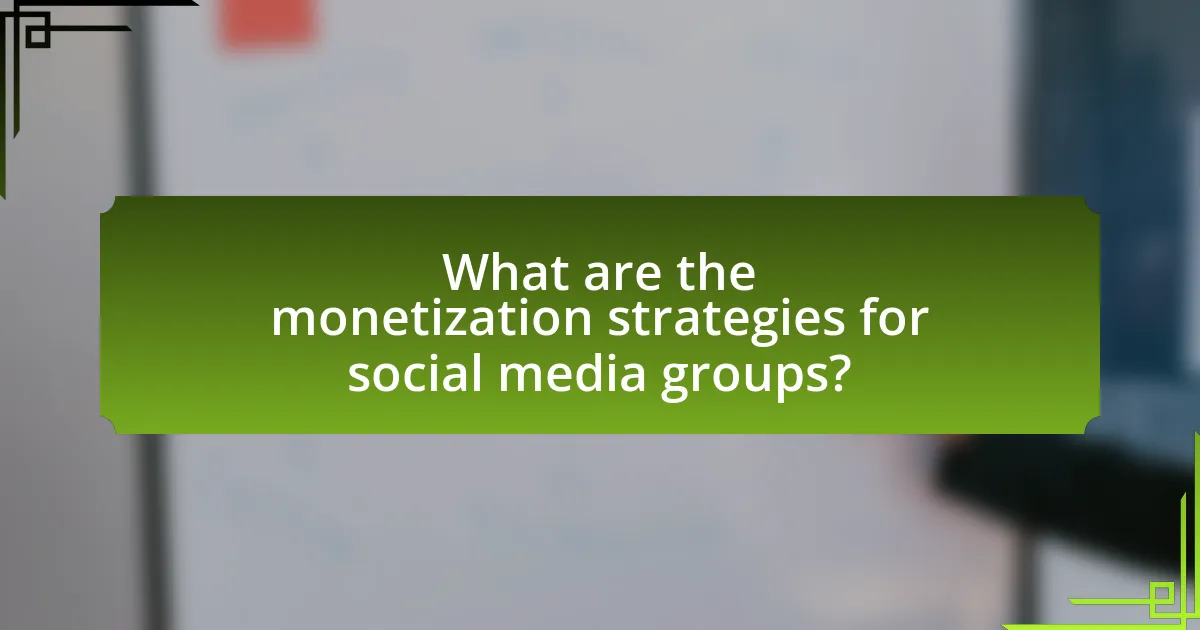
What are the monetization strategies for social media groups?
Monetization strategies for social media groups include subscription models, advertising, affiliate marketing, selling products or services, and offering premium content. Subscription models allow group owners to charge members a fee for exclusive access to content or community features, which can generate a steady income stream. Advertising involves partnering with brands to promote their products within the group, leveraging the group’s audience for targeted marketing. Affiliate marketing enables group owners to earn commissions by promoting third-party products, where they receive a percentage of sales generated through their referrals. Selling products or services directly to group members can also be effective, especially if the offerings align with the group’s interests. Lastly, offering premium content, such as online courses or exclusive webinars, can attract members willing to pay for specialized knowledge or experiences. These strategies are supported by the growing trend of online communities, with reports indicating that 70% of consumers prefer to learn about products through content rather than traditional advertising.
How can group administrators generate revenue from their communities?
Group administrators can generate revenue from their communities by implementing subscription models, offering premium content, and facilitating partnerships with brands. Subscription models allow members to pay a recurring fee for exclusive access to content or features, which has been shown to increase engagement and loyalty. For instance, platforms like Patreon enable creators to monetize their communities effectively. Offering premium content, such as specialized webinars or courses, can also attract members willing to pay for enhanced value. Additionally, partnerships with brands for sponsored posts or affiliate marketing can provide a steady revenue stream, as evidenced by many successful social media influencers who leverage their community reach for brand collaborations.
What are the most effective methods for monetizing social media groups?
The most effective methods for monetizing social media groups include subscription models, affiliate marketing, sponsored content, and selling digital products or services. Subscription models allow group owners to charge members a recurring fee for exclusive content or benefits, which can generate a steady income stream. Affiliate marketing involves promoting products or services and earning a commission on sales made through referral links shared within the group, leveraging the trust and engagement of the community. Sponsored content entails partnering with brands to create posts that promote their products, providing financial compensation in exchange for exposure to the group’s audience. Selling digital products, such as e-books, courses, or merchandise, directly to group members capitalizes on their interest and loyalty, often resulting in higher profit margins. These methods have been successfully implemented by numerous group owners, demonstrating their effectiveness in generating revenue.
How do subscription models work in social media groups?
Subscription models in social media groups allow users to pay a recurring fee for access to exclusive content, features, or community interactions. These models typically involve tiered membership levels, where higher fees grant additional benefits such as premium content, direct communication with creators, or access to specialized groups. For example, platforms like Patreon and Facebook Groups have implemented subscription features that enable creators to monetize their communities effectively. According to a 2021 report by Statista, 25% of content creators utilize subscription services to generate income, highlighting the growing trend of monetization through community engagement.
What role does content play in monetization strategies?
Content is essential in monetization strategies as it drives engagement, builds community, and attracts revenue opportunities. High-quality, relevant content fosters user interaction and loyalty, which are critical for sustaining a community. For instance, according to a HubSpot report, businesses that prioritize content marketing experience six times higher conversion rates than those that do not. This demonstrates that effective content not only enhances user experience but also directly correlates with increased monetization potential through avenues such as advertising, subscriptions, and affiliate marketing.
How can valuable content attract paying members?
Valuable content attracts paying members by providing unique insights, solutions, or entertainment that meets their specific needs or interests. When content addresses the pain points or desires of potential members, it establishes trust and demonstrates the value of membership. For instance, a study by Content Marketing Institute found that 70% of consumers prefer to learn about a company through articles rather than ads, indicating that informative content can effectively engage and convert audiences into paying members. By consistently delivering high-quality, relevant content, organizations can foster a sense of community and loyalty, encouraging users to invest in membership for continued access to valuable resources.
What types of content are most effective for monetization?
The types of content most effective for monetization include video content, subscription-based content, and user-generated content. Video content, particularly on platforms like YouTube and TikTok, generates significant revenue through ads and sponsorships, with YouTube alone paying creators over $30 billion in ad revenue since 2007. Subscription-based content, such as exclusive articles or premium memberships on platforms like Patreon, allows creators to earn consistent income from dedicated followers, with Patreon reporting over $1 billion paid to creators. User-generated content, which encourages community engagement and sharing, can drive traffic and sales, as seen with brands leveraging customer reviews and social media posts to enhance their marketing strategies.
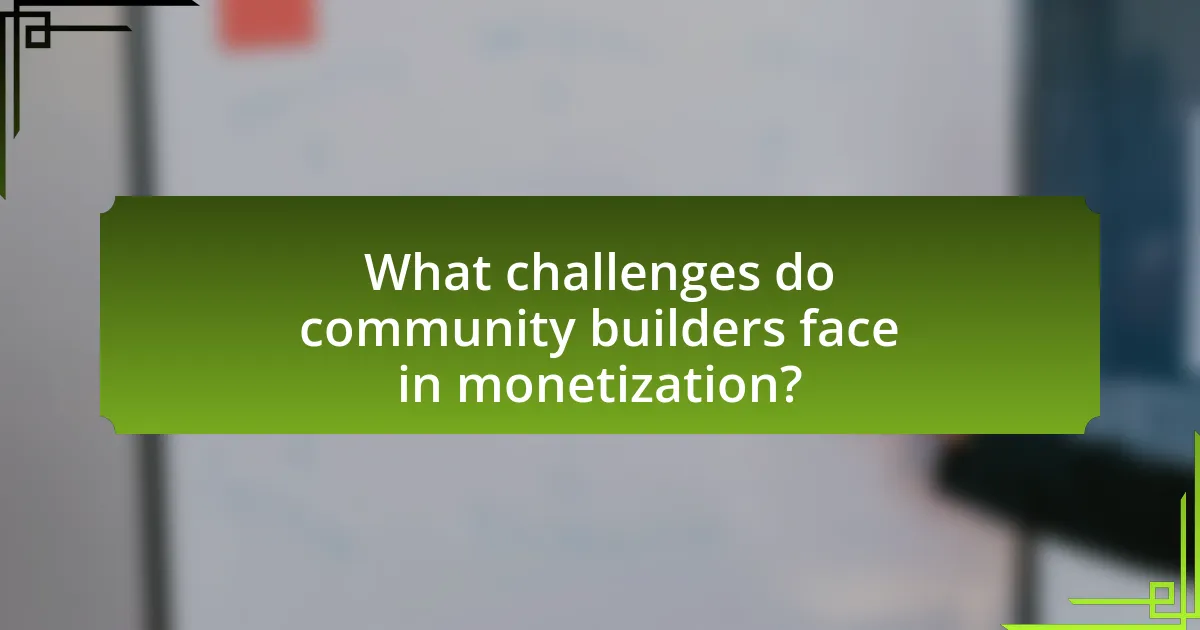
What challenges do community builders face in monetization?
Community builders face significant challenges in monetization, primarily due to the difficulty in balancing community engagement with revenue generation. Many community builders struggle to create monetization strategies that do not alienate their members, as aggressive monetization can lead to decreased participation and trust. Additionally, identifying suitable revenue streams, such as subscriptions, sponsorships, or merchandise, often requires extensive market research and understanding of member preferences, which can be resource-intensive. According to a report by the Community Roundtable, 70% of community managers cite monetization as a top challenge, highlighting the widespread nature of this issue.
How can community builders overcome resistance to monetization?
Community builders can overcome resistance to monetization by clearly communicating the value that monetization brings to the community. This involves demonstrating how funds will enhance community experiences, such as improving resources, hosting events, or providing better content. Research indicates that communities that effectively articulate their monetization strategies see a 30% increase in member support, as members feel more invested when they understand the benefits. Additionally, engaging members in the monetization process, such as through surveys or feedback sessions, fosters a sense of ownership and reduces resistance.
What strategies can be employed to educate members about the value of paid content?
To educate members about the value of paid content, organizations can implement targeted educational campaigns that highlight the benefits and unique offerings of such content. These campaigns can include webinars, where experts explain the advantages of paid content, and case studies showcasing successful outcomes from members who have utilized paid resources. Additionally, providing free trials or samples of paid content can demonstrate its value firsthand, encouraging members to invest. Research indicates that 70% of consumers are more likely to purchase a product after experiencing a free trial, underscoring the effectiveness of this strategy.
How can transparency enhance trust in monetization efforts?
Transparency enhances trust in monetization efforts by providing clear and open communication about how revenue is generated and utilized. When organizations disclose their monetization strategies, including pricing models and revenue-sharing practices, they foster a sense of accountability. Research indicates that 70% of consumers are more likely to trust brands that are transparent about their business practices. This trust leads to increased customer loyalty and engagement, ultimately resulting in higher conversion rates and sustained revenue growth.
What are the ethical considerations in monetizing social media groups?
Monetizing social media groups raises several ethical considerations, primarily concerning transparency, user consent, and the potential for exploitation. Transparency is crucial; group administrators must clearly communicate monetization strategies to members, ensuring that users understand how their data may be used and how monetization affects their experience. User consent is another vital aspect; members should have the option to opt-in or opt-out of monetization practices, such as targeted advertising or paid content. Additionally, the risk of exploitation exists, particularly if monetization prioritizes profit over community well-being, potentially leading to the spread of misinformation or harmful content for financial gain. These ethical considerations highlight the need for responsible practices in the monetization of social media groups to maintain trust and integrity within the community.
How can community builders balance profit with member satisfaction?
Community builders can balance profit with member satisfaction by implementing a value-driven monetization strategy that prioritizes member needs while generating revenue. This approach involves creating premium content, exclusive events, or membership tiers that enhance the community experience without alienating members. For instance, a study by the Community Roundtable found that 70% of community members value engagement and support over financial incentives, indicating that prioritizing member satisfaction can lead to higher retention rates and, ultimately, increased profitability. By focusing on delivering value and fostering a sense of belonging, community builders can achieve a sustainable balance between profit and member satisfaction.
What guidelines should be followed to ensure ethical monetization practices?
To ensure ethical monetization practices, transparency, fairness, and respect for user privacy must be prioritized. Transparency involves clearly communicating monetization methods to users, such as disclosing sponsored content or advertisements. Fairness requires that monetization strategies do not exploit users or create inequitable access to community resources. Respecting user privacy means safeguarding personal data and obtaining consent before using it for monetization purposes. According to the Digital Advertising Alliance, ethical practices enhance trust and engagement, which are crucial for sustainable community growth.
What best practices can enhance community engagement and monetization?
To enhance community engagement and monetization, implementing interactive content, personalized communication, and value-driven incentives is essential. Interactive content, such as polls, quizzes, and live Q&A sessions, fosters participation and keeps members actively involved. Personalized communication, through targeted messages and tailored experiences, strengthens relationships and encourages loyalty. Additionally, offering value-driven incentives, like exclusive content or discounts for active members, motivates participation and drives monetization. Research indicates that communities with high engagement levels can see a 20-30% increase in revenue through effective monetization strategies, demonstrating the importance of these best practices.
How can regular feedback from members improve group dynamics?
Regular feedback from members enhances group dynamics by fostering open communication and trust among participants. When members share their thoughts and experiences, it creates a sense of belonging and encourages active participation. Research indicates that groups with regular feedback mechanisms experience increased collaboration and reduced conflict, as members feel valued and understood. For instance, a study published in the Journal of Organizational Behavior found that teams that engaged in consistent feedback sessions reported higher levels of satisfaction and performance, demonstrating the positive impact of feedback on group cohesion and effectiveness.
What are the key metrics to track for successful community monetization?
The key metrics to track for successful community monetization include engagement rate, conversion rate, customer lifetime value (CLV), and revenue per user (RPU). Engagement rate measures how actively community members participate, which is crucial for understanding the community’s health and potential for monetization. Conversion rate indicates the percentage of community members who take a desired action, such as making a purchase or subscribing to a service, directly linking community activity to revenue generation. Customer lifetime value quantifies the total revenue expected from a member throughout their relationship with the community, helping to assess long-term profitability. Revenue per user provides insight into how much income each member generates, allowing for targeted strategies to enhance monetization efforts. Tracking these metrics enables community managers to make data-driven decisions that optimize monetization strategies effectively.
